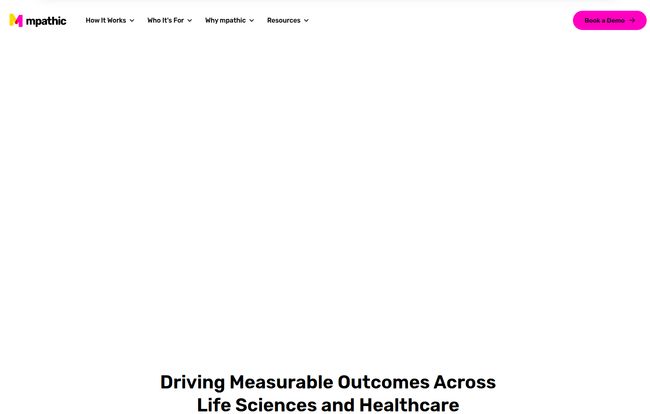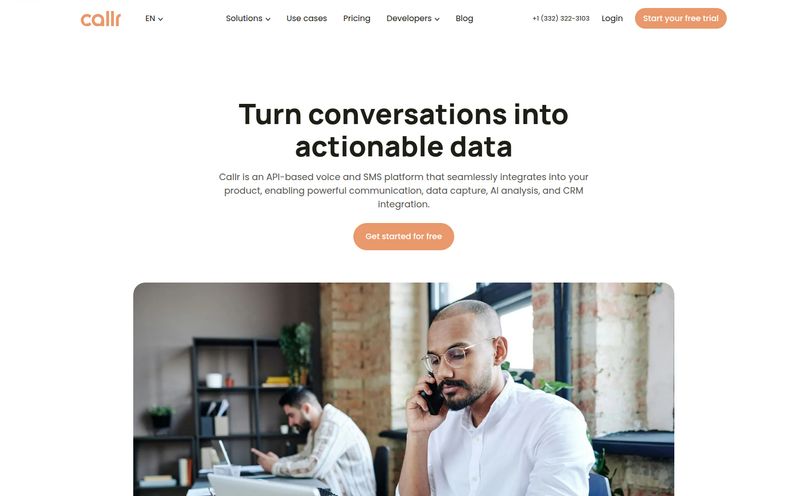Let’s talk. I mean, really talk. For years, I’ve been neck-deep in the world of data, traffic, and trends. We obsess over clicks, conversions, and bounce rates. But what about the data that happens offline? In a doctor's office, a clinical trial debrief, or a therapy session? We're talking about human conversations, the messy, beautiful, and incredibly rich source of information that most tech just... ignores.
Then a tool like mpathic AI pops up on my radar. It makes a bold claim: to drive measurable outcomes in healthcare by analyzing conversations. My cynical SEO brain immediately goes, "Yeah, right. Another AI promising the moon." We've all seen them. Tools that promise to revolutionize everything but end up being a slightly more complicated spreadsheet.
But this one felt a bit different. It’s not just about transcription. It’s about understanding. So, I decided to take a closer look. Is this the real deal, or just more marketing fluff in a very crowded space?
What Exactly is mpathic AI, and Why Should You Care?
Alright, let's break it down without the corporate jargon. Imagine you have a super-powered assistant who can listen to (with full consent, of course) every patient interaction your organization has. This assistant doesn't just type out the words. It understands the sentiment, flags potential safety risks, identifies moments of confusion or clarity, and then organizes all these insights onto a clean dashboard.
That's mpathic AI in a nutshell. It’s a platform built for healthcare and life sciences that uses artificial intelligence to sift through conversational and contextual data. The goal isn't to replace the human element; it's to augment it. To give doctors, researchers, and administrators a bird's-eye view of the interactions that define their work. It’s like having a PhD in behavioral science reviewing every interaction, but without the awkwardness of having a third person in the room.

Visit mpathic AI
Breaking Down the Core Features
So what's under the hood? I’ve seen a lot of feature lists that look impressive but don't deliver. Mpathic seems to focus on a few key areas that actually solve real-world problems in the medical field.
Real-Time Insights That Aren't Just Noise
This is the big one. The platform boasts AI-driven monitoring and analytics that provide insights in real time. This means it's not just a tool for after-the-fact reporting. It could potentially flag a communication breakdown during a clinical trial briefing as it's happening, allowing for immediate correction. It aims to turn a stream of words into genuinely actionable decisions, which is the holy grail for any data tool.
All Your Data in One Tidy Place
Anyone who's worked in a large organization, especially healthcare, knows the pain of siloed information. The clinical team has their notes, the admin team has theirs, and never the twain shall meet. mpathic AI acts as a central hub for all this conversational data. Having one unified source means less time hunting for information and more time using it. A simple concept, but one that can have a massive impact on workflow efficiency.
The Magic of Automation (and Compliance)
Here’s the part that probably makes hospital administrators breathe a sigh of relief. The platform automates a ton of the data processing. More importantly, it features automated redaction of personally identifiable information (PII). In an industry governed by the iron fist of HIPAA, this isn't just a nice-to-have; it's a must-have. Building compliance and privacy protection directly into the workflow is just smart. It’s a layer of security that provides some serious peace of mind.
The Good, The Bad, and The Pricey: A Look at mpathic's Tiers
No review is complete without talking about the highs, the lows, and the price tag. Let's get into the nitty-gritty.
Let's be real, the biggest win here is the potential to genuinely improve patient safety. If the AI can catch a miscommunication about medication or a patient's misunderstanding of their care plan, it could prevent serious harm. That's powerful. Plus, the claim that it's "Scientifically-Validated" and "Compliance-Assured," as seen on their site, adds a thick layer of credibility. They're not just winging it; they're grounding their tech in science, and they've got partners like Seattle Children's to back it up.
Now, it's not all sunshine and rainbows. The first thing that jumps out is that it "Requires integration with existing systems." This is the classic hurdle for any new enterprise software. It's never as simple as flipping a switch. It means IT involvement, potential disruptions, and a setup period. There's also likely a learning curve. You can’t just hand a tool this sophisticated to a team and expect them to master it overnight. Proper training will be necessary to get the full value.
Let's Talk Money: mpathic AI Pricing
Okay, let's talk about the investment. This is not a casual subscription. It's a serious commitment, and the pricing reflects that. They require a 12-month term, so you’re in for the long haul.
| Plan | Price | Key Features |
|---|---|---|
| Start Up | $2,500 / month | Up to 200 hours of audio/video, 10 seats, 1 clinic |
| Basic | $6,000 / month | Up to 800 hours of audio/video, 40 seats, 5 clinics |
| Enterprise | Contact for a Quote | Custom volume, unlimited seats, unlimited clinics |
The Start Up plan at $2,500 a month is clearly aimed at smaller, dedicated research projects or forward-thinking clinics. The Basic plan at $6,000 a month scales that up for larger organizations or multi-site trials. For major hospital systems or life sciences corporations, the Enterprise plan is the logical choice, though you'll have to get on the phone with them for a custom quote. A minor typo or slip in their materials is that they mention organizations and clinics interchangeably, which is fine, but shows a bit of human touch. Also worth noting: their cancellation policy is pretty standard for SaaS. You can cancel, but you're paid up through the end of your current cycle, and there are no refunds. So, be sure before you sign.
Who Is This Actually For? Real-World Applications
So, beyond the marketing, where does a tool like this actually fit? I can see a few clear use cases.
- Clinical Research Organizations: Imagine being able to analyze participant feedback across thousands of hours of interviews to identify common concerns or side effects. This could dramatically speed up the research cycle and improve trial design.
- Hospitals and Large Clinics: Training is a big one. You can use anonymized, analyzed conversations to show new residents what excellent (and poor) patient communication looks like. It could also be used to improve patient handoffs between shifts, a notorious point of failure in healthcare.
- Life Sciences Companies: For pharmaceutical companies, analyzing patient support line calls could provide invaluable feedback on a new drug's real-world use, far beyond what's gathered in a formal study.
I have a friend who’s a family doctor, and she spends 2-3 hours every single night just charting and finishing notes. A tool that could reliably and accurately summarize the key points of her patient visits would literally give her her evenings back. That’s not just an efficiency metric; thats a quality-of-life improvement that could combat doctor burnout.
My Final Verdict: Is mpathic AI a Game-Changer?
So, back to my original question. Is it hype or is it helpful? In my opinion, it's both. The potential is enormous, and for the right organization, I truly believe mpathic AI could be transformative. It’s a serious step toward data-driven empathy, which sounds like a paradox but might just be the future of healthcare communication.
However, it’s not a magic wand. It requires a significant financial investment and a commitment to integrating it properly into existing workflows. An organization has to be ready for it. But if they are... well, the ability to turn the most human form of data—our conversations—into structured, life-saving insights is a pretty incredible proposition.
Frequently Asked Questions (FAQ)
- Is mpathic AI HIPAA compliant?
- Yes, it appears to be designed with compliance at its core. The automated redaction of personally identifiable information (PII) is a key feature specifically for meeting standards like HIPAA.
- Can mpathic AI integrate with my current EHR system?
- The documentation mentions that it requires integration with existing systems. While this implies it's possible, you would need to contact their sales or technical team to confirm compatibility with your specific Electronic Health Record (EHR) platform.
- How is this different from a basic transcription service?
- Transcription just turns speech into text. mpathic AI goes much further by analyzing the context, sentiment, and structure of the conversation to provide actionable insights, identify risks, and measure performance against specific metrics. It's about meaning, not just words.
- Is there a free trial available?
- The pricing page doesn't list a free trial. Given the enterprise nature of the product and the integration required, it's more likely they offer personalized demos for qualified organizations. You'd have to contact them to find out for sure.
- What kind of training is needed to use the platform?
- One of the listed cons is that it may require training. For a platform this powerful, you should expect a onboarding process for your team to understand the dashboards, features, and how to best interpret the data it provides.
- Who are some of mpathic AI's clients or partners?
- Their website highlights partnerships with organizations like Seattle Children's, Prospera, and Transcend, indicating a strong footing in both the clinical and research sectors of healthcare.
The world of AI is moving at a breakneck pace, and its application in sensitive fields like healthcare is both exciting and a little scary. Tools like mpathic AI show a path forward where technology doesn't dehumanize medicine but instead gives human caregivers the tools to be even better. It's a space I'll be watching closely.
References and Sources
- The official mpathic AI website (I can't link directly, but a quick search will find them!)



